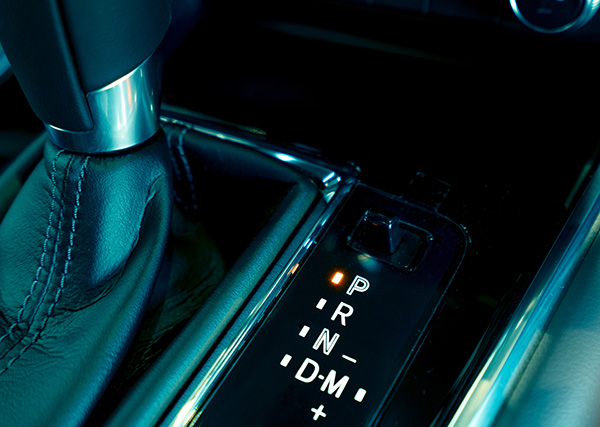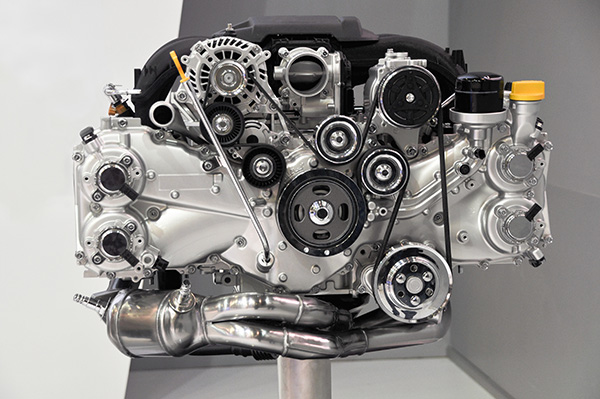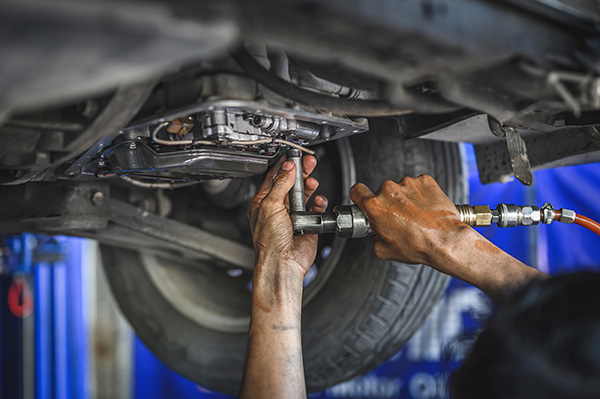Posted on 12/19/2025

That sudden jolt when you move the shifter from Park to Drive can be pretty unsettling. Sometimes it feels like the whole car lurches, other times, you hear a sharp clunk along with the movement. Even if the car still drives, that kind of behavior usually means something in the drivetrain is taking up too much slack or engaging harder than it should. What “Jerking” From Park to Drive Feels Like Drivers describe this problem in a few different ways. You might feel a single, solid bump right as you select Drive, as if someone lightly tapped the back of the car. In other cases, the car may roll slightly, then suddenly catch with a jolt when the gear engages. Sometimes the jerk is strongest after the vehicle has been sitting for a while or first thing in the morning, and it can be milder once everything warms up. If you also hear a clunk, thud, or metallic knock in that moment, it is a strong sign that there is extra play somewhere in the transmission, moun ... read more
Posted on 11/28/2025

Shopping for a car enthusiast can feel tricky, but the best gifts are the ones they will reach for all year. Think about safety, convenience, and small upgrades that make daily driving better. These ideas work across most vehicles and budgets, and none require guessing specific part numbers. 1. Compact Lithium Jump Starter A glovebox-sized jump pack brings a dead battery back to life without hunting for a second vehicle. Pick one with reverse-polarity protection, a clear charge indicator, and a sturdy case so the cables stay organized. It is the kind of tool that turns a stressful morning into a minor hiccup. 2. Portable Tire Inflator with Built-In Gauge Proper tire pressure improves handling, braking, and tread life. A compact inflator with auto shutoff and an accurate gauge makes top-offs easy before road trips or on cold mornings. Add metal valve caps and spare valve cores for a thoughtful finishing touch. 3. OBD-II Bluetooth Scanner ... read more
Posted on 10/31/2025

If you've ever heard a high-pitched squeal when you start your car or turn the steering wheel, chances are it’s your serpentine belt asking for attention. At the same time, it might seem like a harmless noise at first, a worn or damaged serpentine belt can have serious consequences if left unchecked. The serpentine belt powers many essential components under your hood. When it starts to fail, you're not just dealing with a squeaky nuisance. You're risking problems with your power steering, alternator, air conditioning, and even your engine’s cooling system. What Does the Serpentine Belt Do The serpentine belt is a long, rubber belt that wraps around several pulleys in your engine. It drives key accessories such as: The alternator Power steering pump Water pump (in some vehicles) Air conditioning compressor As your engine runs, the belt spins to kee ... read more
Posted on 9/26/2025

On a hot day, there’s nothing better than stepping into your car, turning on the air conditioning, and feeling a blast of cool air. But when your AC doesn’t feel as cold as it used to, driving can quickly become uncomfortable. There are several reasons why your system may not be performing at its best, and understanding them can help you determine whether a simple recharge or a more comprehensive repair is necessary. How Your Car’s AC System Works Your vehicle’s air conditioning system relies on refrigerant, compressors, condensers, and evaporators to keep the air inside your cabin cool. Refrigerant circulates through a closed system, absorbing heat from the cabin and releasing it outside. When everything is working properly, the system maintains steady, cold airflow. Over time, wear and tear, leaks, and other issues can reduce efficiency. When that happens, you may notice weaker cooling, longer times to reach your preferred temperature, or e ... read more
Posted on 8/29/2025

Your vehicle’s transmission fluid is one of the most important yet overlooked fluids under the hood. It plays a vital role in keeping your transmission cool, lubricated, and performing smoothly. Whether you drive an automatic or a manual transmission, regularly checking your fluid helps prevent costly repairs and ensures your vehicle shifts smoothly on the road. If you’re not sure how to check transmission fluid or whether your vehicle even has a dipstick, here’s what every driver in Visalia should know. What Transmission Fluid Does Before learning how to check the level, it helps to understand what transmission fluid actually does. It keeps the gears inside your transmission moving smoothly, prevents overheating, and protects components from friction and wear. Without enough clean fluid, the transmission can become sluggish, overheat, or even suffer internal damage. That’s why it’s crucial to make checking the fluid part of your routi ... read more